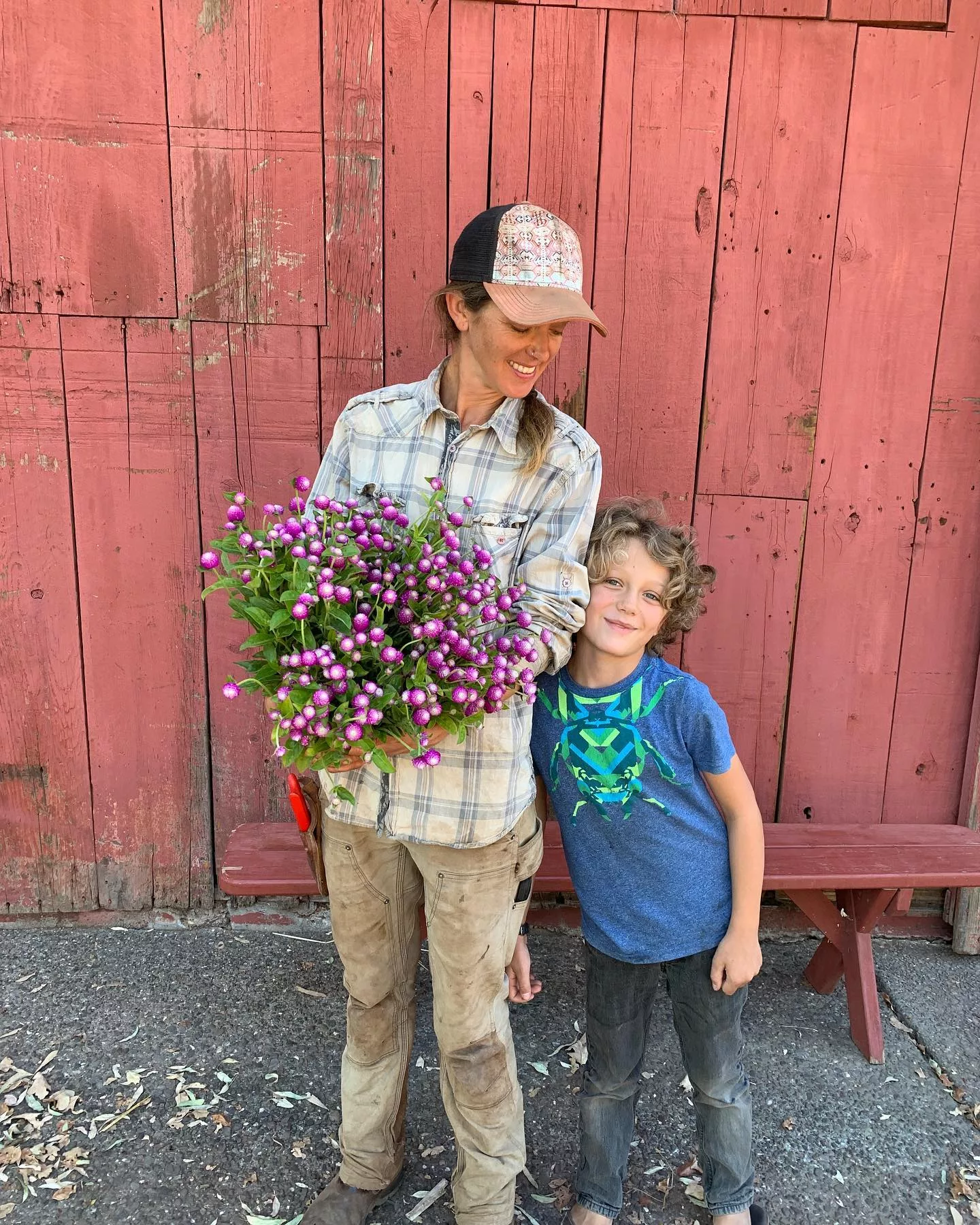
Melissa Bucklin believes life at Oak Hill Farm has taught her sons Jade and Bodhi, above, about labor, food production and the way the world works.
In today’s world kids’ lives often revolve around images on a screen, which can be addictive and lead to lowered self-esteem and increased anxiety. Too much time online can also mean a loss of beneficial time outdoors or spent with family. Add to this the pressures brought on by the worsening climate crisis and today’s youth face stresses their parents’ generation couldn’t imagine.
For kids growing up within a family business, they can benefit from the grounding qualities of real-world life skills, including the joy of hands-on work and resilience in the face of challenges. We spoke with members of four North Bay businesses who see the valuable lessons their children are learning from being around the family business.
****
Maggie Levinger and husband Luke Regalbuto are the owners of the eco-conscious business Wild West Ferments. They opened the doors to their new West Marin Culture Shop over the Fourth of July weekend. Their 8-year-old son Lanzo Regalbuto loves hanging out in the shop with his parents.
Wild West Ferments products are sold wholesale to natural food stores, cafes and restaurants. They sell at farmers markets in San Rafael, Oakland and the seasonal market in Point Reyes Station.
Their new West Marin Culture Shop, located in Point Reyes Station, is large enough to hold their production facility, retail spaces and popups. They’re able to sell more of their cultured products there, including fermented beverages on tap. They’re even serving fermented drinks with Double Eight Dairy water buffalo soft serve ice cream in healthy and delicious floats.
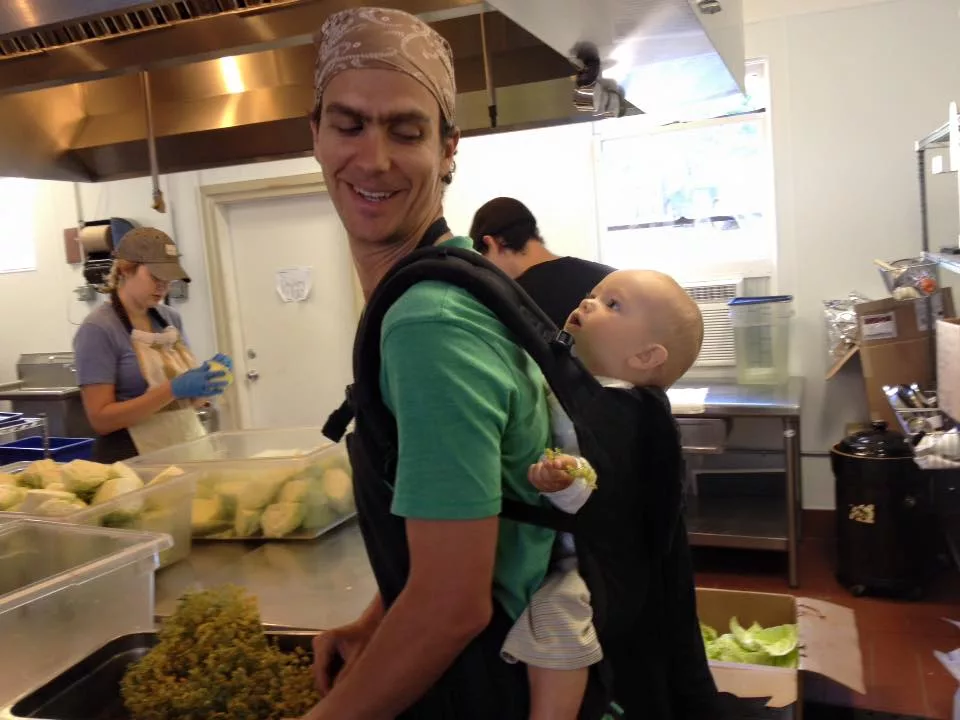
Levinger says the response has been positive. “Yeah, like really, really good vibes,” she says. “In the shop, people are really happy, so that feels good. And business has been good.”
Lanzo has grown up around the business. When he was small enough to be carried in a back carrier, Levinger would have him on her back while she made sauerkraut.
“You know, that was probably one of the easier portions of time because he was happy back there to just watch what was happening,” Levinger says. “He was safe and out of the way, and I could do my work. At some point, he’d fall asleep, you know, and I could just keep working.”
Once he became a toddler he would sometimes go to daycare while Levinger worked, but she found she could still have him with her when she ran booths at farmers markets.
“That was a place I could still bring him and get my work done,” she says. “He could hang around the booth and just be a part of the market community, which is a pretty kid-friendly place. And now, you know, he really loves to be at the shop. If the shop is open, he wants to be there.”
“He’s just a total shop kid now,” Levinger says. “He’s always making really strong relationships with all the people that work for Wild West and at the culture shop. He’s a pretty gregarious kid and a conversationalist for sure. It’s definitely like a happy place for him to be, in the hubbub like that.”
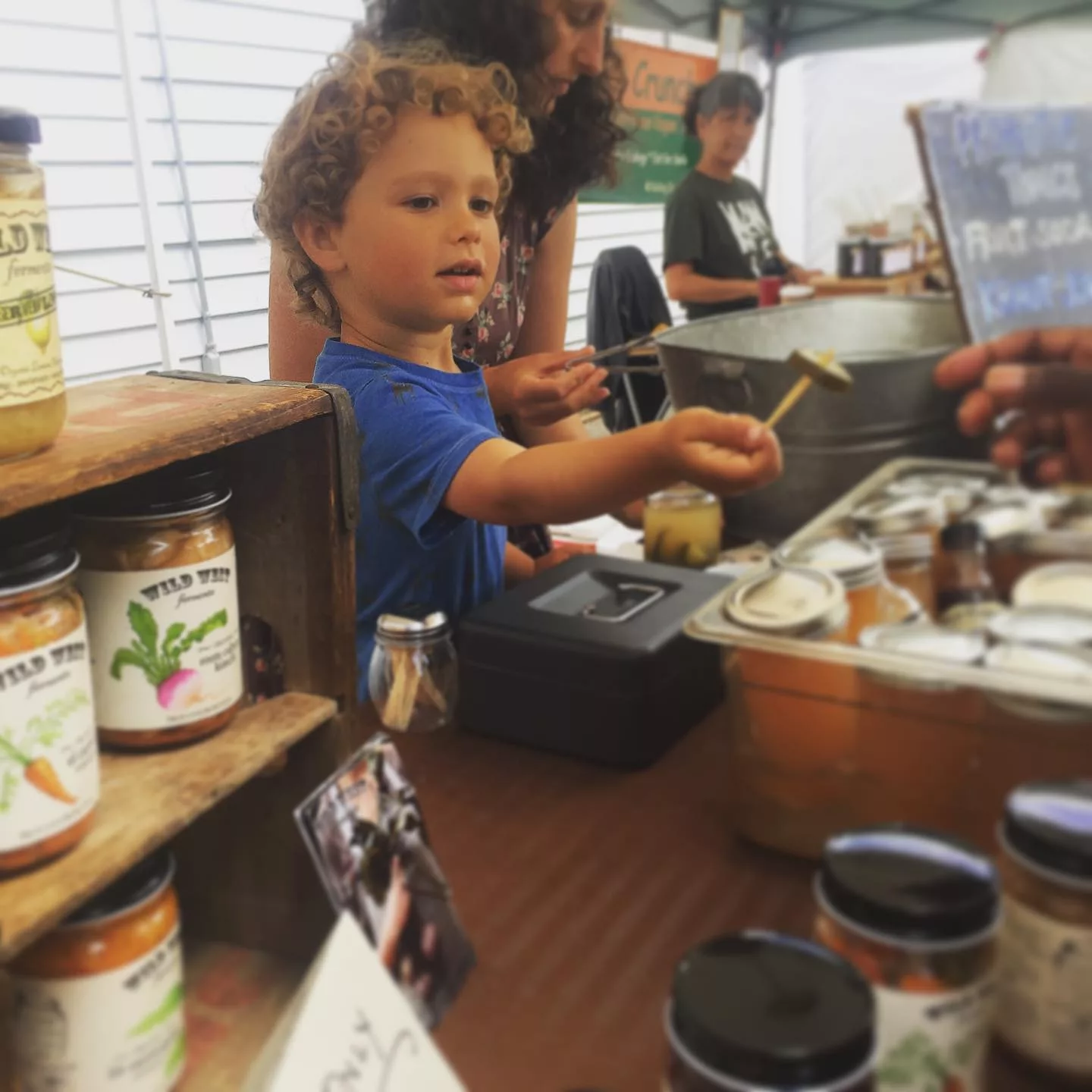
Lanzo is in the second grade and says most of his friends from school know about the shop. He likes when they visit. “We like going upstairs and spying on the grownups,” he laughs. They watch the shoppers milling about below.
He says, “My favorite days at the shop are ice-cream day and grilled-cheese day.” Lanzo’s ice cream is served up with a fermented drink and his grilled cheese sandwich is made with cheese, tomato and sauerkraut. Those healthy choices reflect one of the beneficial influences of growing up around his family’s cultured-foods business.
“I believe he’s learning a lot about hard work and dedication to something—you know, sticking with something long enough for it to grow and transform,” Levinger says. “I think he’s learning a lot about teamwork and building family out of the people that are around you—your coworkers or your employees.”
Levinger believes that seeing his parents work through the ups and downs that come with a business is teaching Lanzo about resilience. She hopes this will help when he later looks at climate chaos and the ability of the planet to heal itself.
****
One of the popups staging at the West Marin Culture Shop has been Kinoko Japanese Home Cooking. Owner and chef Yuko Kaneko says although she’s a self-taught chef, she learned a lot about Japanese home cooking from her mom. She’s following that tradition by teaching her own kids to cook and they’re keen to join in and help with their mom’s business.
Kaneko prepares and serves up onigiri, or rice balls with fillings like umeshiso, which are salted ume plums; negimiso, which is miso paste and scallions; and sake, or wild Alaskan salmon. She offers Asian tuna salad and egoma, which are marinated sesame leaves; and donburi, or rice bowls with sukiyaki beef, teriyaki chicken, tofu and chicken meatballs.
Kaneko sells at the Point Reyes Station Farmers Market. She is also temporarily at the Northgate Mall, which is hosting the Marin Farmers Market until construction is finished at the Marin Civic Center farmers market site in San Rafael.
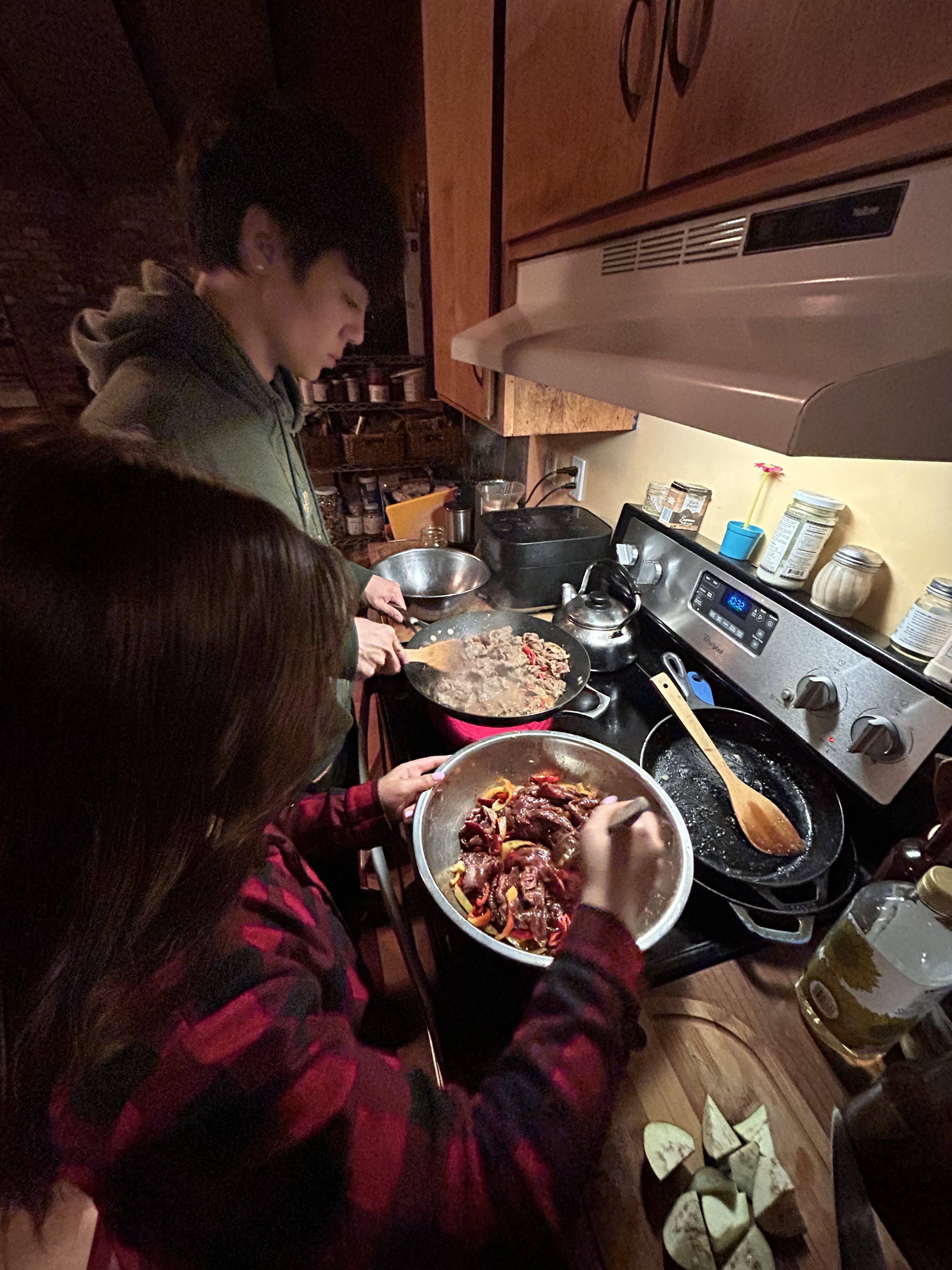
Her son, Teiji Konopka, is 15 years old and likes to help his mom when she sells at farmers markets. Her daughter, Emi Konopka, is 11 and can’t wait until she’s old enough to help out too.
Teiji has been learning about running a business as he helps her at the markets. “He’s very talkative and friendly, so he’s very good at customer service,” Kaneko says.
“When he helps me, he takes orders from customers and he’s very flexible,” Kaneko says. “If we are sold out of something a customer wanted, he just immediately suggests something else to the customer. I didn’t really teach him that, but he’s really good at it.”
Kaneko adds, “He’s learning how one goes fast to serve people—and cleanliness too. As a professional, [one’s] look has to be nice and clean too. That part he has learned.”
Her daughter Emi also likes to cook and wants to help. “My son started helping me when he was 12,” Kaneko says. “[Emi’s] now 11. She’s kind of waiting for the next step. She wants to help me at the market. Maybe next year.”
****
At the Petaluma East Side Farmers Market, which operates Tuesdays on McDowell Boulevard, Maggie La Rochelle and Matt Gunn of Sunray Farm have a booth where they sell organic produce, microgreens and flowers. Sometimes they even have bouquets created by their 6-year-old son, Jules Gunn.
La Rochelle and Gunn run the small climate-resilient, sustainable farm just outside of Sonoma. It’s supported by the property owner and founder, Mark Feichtmeir, who had the vision to create an organic, sustainable farm on his property. The couple helped get the farm started and they sell their produce and flowers to restaurants, caterers, chefs, a food truck and at the farmers market.
Jules spends time with his two grandmothers when his parents are off doing the farmers market. His grandmothers sometimes bring him to the market and he enjoys seeing his parents there at the booth.
His parents have even let him help out a bit while he’s there. “He has taken money a couple of times, you know, like he’s doing the transaction,” Gunn says.
After watching his mom create the bouquets they sell, Jules now also makes a few of his own bouquets and asks his mom to take them along to sell at the market. She says many of the kids who frequent the market know Jules and they like buying his flowers.
“When I say,’ look, your stuff sold, and you made $3,’ he is just beaming,” La Rochelle says.
“He’s definitely picking up on what sells and he feels a part of the team,” La Rochelle says. “We talk to him about that—that he is a part of the team—and so I think he does feel that way. He has such a clear sense of self and it’s wonderful to see how it reinforces that.”
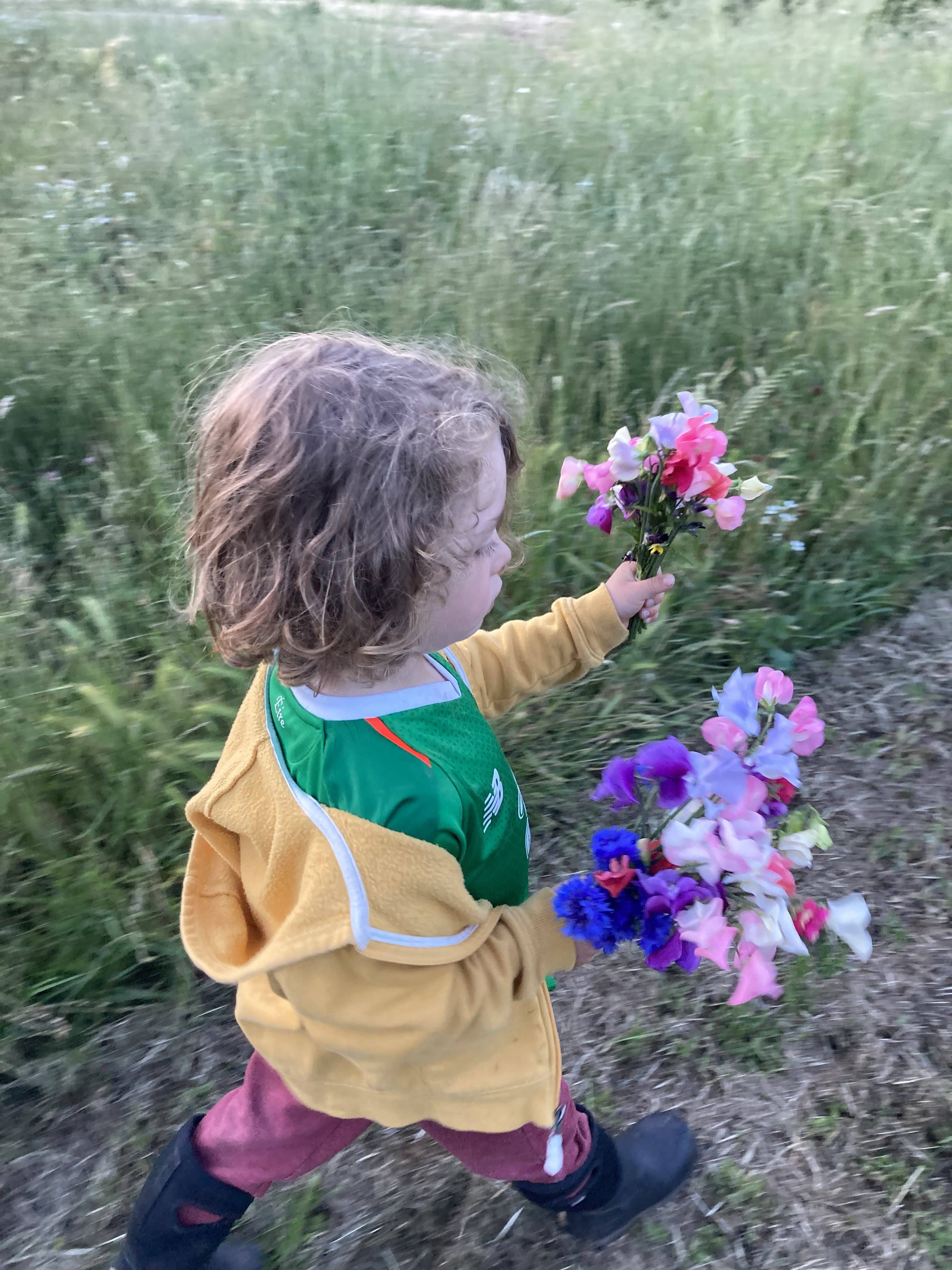
Gunn adds, “The other day, just randomly, I was driving him to school and he was like, ‘Dad, do you have the best lettuces at the market?’ And I was like, well, I think we do, actually. Even just buried in that little question that he asked was a bit of pride about, like, our stuff’s really good.”
Jules attends a local Waldorf school and Gunn says that being the kid from the organic farm is highly regarded. “I don’t think farming often has much status, but in that small community maybe it does,” he says.
Jules also spends time playing soccer and basketball, so he has plenty of fun on and off the farm. He likes tagging along after his mom and dad on the farm. He especially likes looking for toads, frogs and insects. His mom says that at this stage it’s mostly all about the critters.
The small farm has provided an opportunity for the family to be together more than they would have if they had to leave for their jobs every day. Whether they’re working in their home office and he’s playing outside or he’s out in the fields with them, he’s getting a rich experience. They prefer that to having him get a lot of screen time.
La Rochelle says she loves that he is able to be there with them, exploring in a safe environment. “His interest in these frogs is pretty impressive,” she says. “He’ll be very happy to spend up to an hour just observing, catching, holding, putting back, going to the next one, staking out little territories and just being really immersed in the play of it.”
“Jules can happily be looking for frogs in the irrigation box while I’m trying to squeeze in a little planting up there,” Gunn says. “There’s a lot to explore. There are ladybugs to find and frogs to catch. He’s just doing his 6-year-old work of playing, and I’m doing the work of farming right by him.”
Jules’ parents believe strongly that it’s good for his development to have natural space around. “He’s interacting with great blue herons and critters and little things being born in the spring,” Gunn says. “He’s seeing how carrots get pulled out of the ground and what they look like and digging potatoes out of the ground. There’s a benefit to that involvement in these natural processes. I just believe that’s a good upbringing.”
They had hosted a Waldorf Lantern Walk at the farm and La Rochelle says that Jules’ teacher admired how relaxed he was in the outdoor environment and how comfortable he was moving around independently. “That made my heart warm,” she says.
****
La Rochelle and Gunn speak of their love for the local community and the other farms that are a part of that. They are friends with Melissa Bucklin and her husband James Good of Oak Hill Farm in Glen Ellen. Bucklin and Good are also raising a family on the farm.
They’re running the farm in the same spirit as Bucklin’s grandmother, making it as environmentally sustainable as possible. Like many local farms, they’re weathering the challenges that the past few years have wrought.
They grow and sell flowers and those were impacted this year by a very late start due to the wet winter. They sell most of their flowers to the San Francisco Flower Market and Bucklin noted that the wholesale flower business has changed and has dropped significantly this year.
They also sell their organic produce to local restaurants, Oliver’s Markets and at the Sonoma Farmers Market. They even have their own Red Barn Store on the farm where they sell their flowers and produce.
Their two sons Jade, 15, and Bodhi, 11, are growing up on the farm. Bucklin laughs when conceding that Jade is not really that happy about being on a farm. “He would much rather be living in a city,” Bucklin says. “He just doesn’t love nature and agriculture the way we do. It’s just not interesting to him.
“One of the most important lessons for me as a parent has been embracing the fact that your kids have different priorities than you do, and that becomes much more apparent as they get older and kind of figure out what they want to be,” Bucklin says. “The challenge for me has been to find ways to connect with him.”
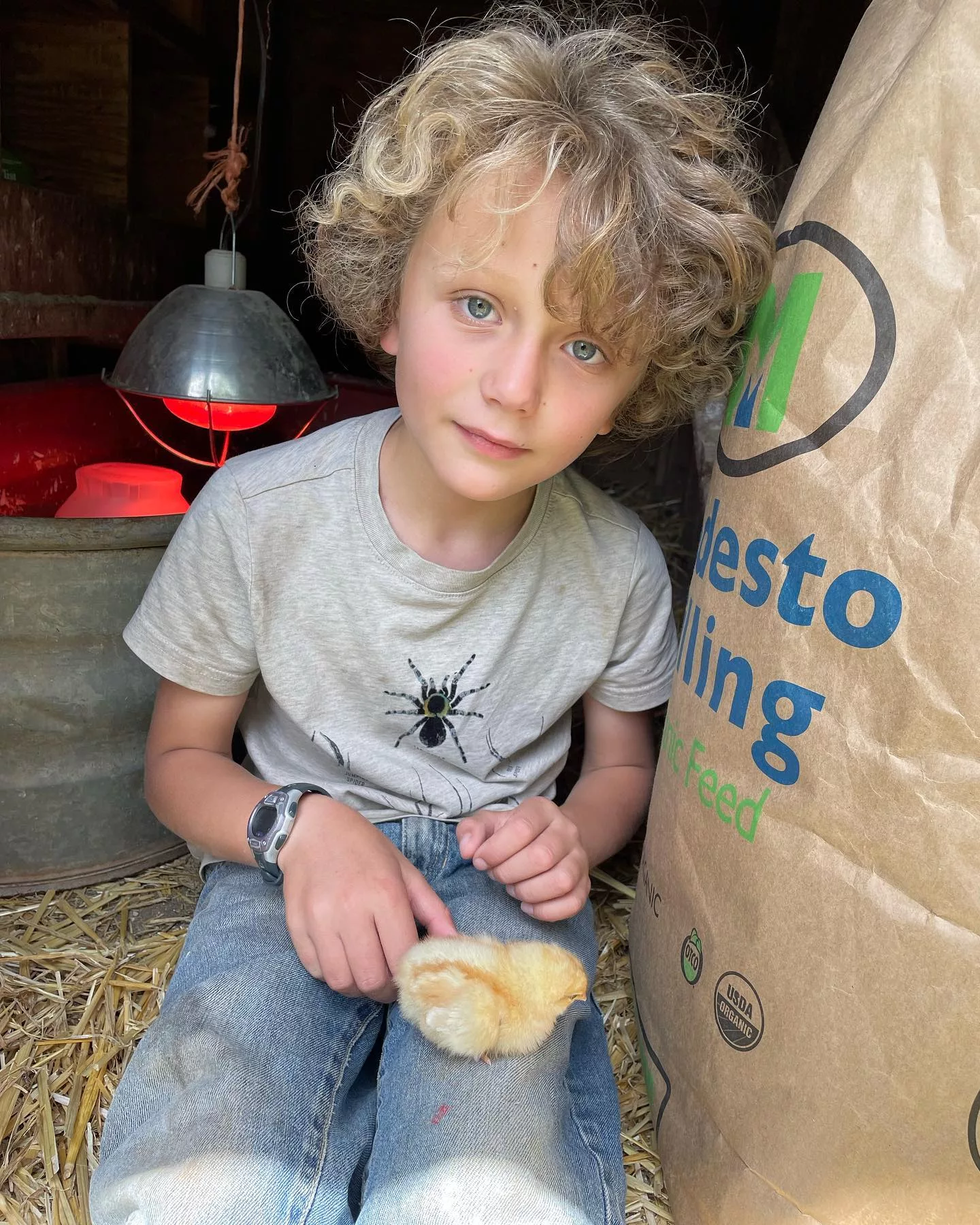
Their younger son, Bodhi, does enjoy being on the farm. “He runs his own small laying flock of hens and sometimes sells his eggs in the Red Barn,” Bucklin says. She notes that when he does have a few to put in the store they quickly sell out.
Bodhi also loves mechanics and the machinery on the farm. He won’t be driving a tractor until he’s 16, which he eagerly awaits. “He will just watch his dad in the field or working on things in the shop,” Bucklin says. “And he’s just really interested in the way machines work.”
Bucklin says she believes that being on the farm has taught both her boys about responsibility and physical labor, the way the world works and the way that food is produced. “Most people in the world don’t have the opportunity to experience that,” she says.
With the changing climate, farmers are facing more challenges—and for kids growing up on a farm this can be a hard reality that comes with the benefit of lessons in resilience.
“In agriculture, you have no choice but to deal with whatever the climate throws at you,” Bucklin says. “Sometimes they see how stressful that is for us. They also see that we [as] humans are capable of dealing with challenging situations, and figuring out how to resolve problems that we face.”
Back at Sunray Farm, La Rochelle and Gunn hope that Jules’ upbringing will also help him face any fears that might come up later around climate change.
“When you make a relationship with climate in terms of a relationship with your local environment it’s much more empowering,” La Rochelle says. ”It’s much less scary, because it gives them an avenue to understand and apply some of the resiliency that we’re all looking for, rather than it just being like a nightmare.”



